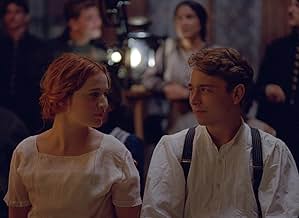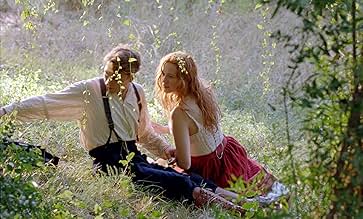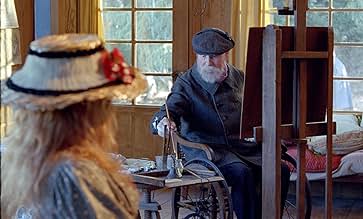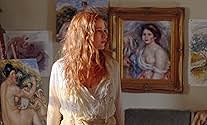Renoir
- 2012
- Tous publics
- 1h 51min
NOTE IMDb
6,5/10
6,1 k
MA NOTE
Installé sur la Côte d'Azur durant l'été 1915, Jean Renoir, fils du peintre impressionniste, rentre chez lui en convalescence auprès d'Andrée après avoir été blessé lors de la Première Guerr... Tout lireInstallé sur la Côte d'Azur durant l'été 1915, Jean Renoir, fils du peintre impressionniste, rentre chez lui en convalescence auprès d'Andrée après avoir été blessé lors de la Première Guerre mondiale.Installé sur la Côte d'Azur durant l'été 1915, Jean Renoir, fils du peintre impressionniste, rentre chez lui en convalescence auprès d'Andrée après avoir été blessé lors de la Première Guerre mondiale.
- Réalisation
- Scénario
- Casting principal
- Récompenses
- 3 victoires et 11 nominations au total
Anne-Lise Heimburger
- La boulangère
- (as Annelise Heimburger)
Thierry Hancisse
- Le brocanteur
- (as Thierry Hancisse de la Comédie Française)
Cécile de Moor
- Servante Collettes
- (as Cecile Rittweger)
Avis à la une
Appropriately enough, about the world's most famous Impressionist painter.
While it's definitely not for those who strongly favor conventionally plotted drama or fast action, RENOIR consists of immediate realism and puts you right with the Renoir clan on the French Riviera. It's the sort of film that could easily have been made overly artsy and dull, but it's neither.
The entire story takes place in 1915, toward the end of Renoir's life. The relationship between model Andrée Heuschling and son Jean Renoir is, in many ways, more the subject of the story than the painter himself, yet Renoir himself is indispensable as "the boss," a sort of god-like backdrop to the entire cast and story. Having said that, I must add that there is a fair amount on Renoir's artistic processes, and his philosophizing can be applied to all sorts of art-forms as well as painting. One of RENOIR's strongest aspects is its portrayal of a man who is obsessed with his work and has one thing which utterly engulfs and consumes him.
Like many French films, RENOIR succeeds in breaking all sorts of rules. Among them:
--The plot is meandering and somewhat slice-of-life but still gripping;
--Andrée, the "girl from nowhere," and free but neglected youngest son Coco are characters that beg to be developed further, but at the same time, perhaps it's better that they remain mysterious;
--Lots of female nudity without it seeming the least bit gratuitous: After all, the subject is an artist who often painted naked girls;
--The mood is a successful mesh of somberness, poignancy, and (often laugh-out-loud) humor.
Just about every artsy cliché could be applied to this film, but suffice it to say that it is a beautiful experience. Even simple colors come alive here for the audience as they did for Renoir himself. I'm a word person who's never been a big painting aficionado, but this film made me see the visual arts in a whole new light and may even have converted me to some extent. The soundtrack--quiet, unobtrusive piano scores in the background--also does a great deal to carry this film.
While it's definitely not for those who strongly favor conventionally plotted drama or fast action, RENOIR consists of immediate realism and puts you right with the Renoir clan on the French Riviera. It's the sort of film that could easily have been made overly artsy and dull, but it's neither.
The entire story takes place in 1915, toward the end of Renoir's life. The relationship between model Andrée Heuschling and son Jean Renoir is, in many ways, more the subject of the story than the painter himself, yet Renoir himself is indispensable as "the boss," a sort of god-like backdrop to the entire cast and story. Having said that, I must add that there is a fair amount on Renoir's artistic processes, and his philosophizing can be applied to all sorts of art-forms as well as painting. One of RENOIR's strongest aspects is its portrayal of a man who is obsessed with his work and has one thing which utterly engulfs and consumes him.
Like many French films, RENOIR succeeds in breaking all sorts of rules. Among them:
--The plot is meandering and somewhat slice-of-life but still gripping;
--Andrée, the "girl from nowhere," and free but neglected youngest son Coco are characters that beg to be developed further, but at the same time, perhaps it's better that they remain mysterious;
--Lots of female nudity without it seeming the least bit gratuitous: After all, the subject is an artist who often painted naked girls;
--The mood is a successful mesh of somberness, poignancy, and (often laugh-out-loud) humor.
Just about every artsy cliché could be applied to this film, but suffice it to say that it is a beautiful experience. Even simple colors come alive here for the audience as they did for Renoir himself. I'm a word person who's never been a big painting aficionado, but this film made me see the visual arts in a whole new light and may even have converted me to some extent. The soundtrack--quiet, unobtrusive piano scores in the background--also does a great deal to carry this film.
Painter Pierre-Auguste Renoir (Michel Bouquet) is an ancient man by 1915. It is WWI, and his two eldest sons, Pierre and Jean (Vincent Rottiers), are at war, while his youngest, Claude (Kid with a Bike star Thomas Doret), just a boy, plays around the estate, claiming to be an orphan (his mother dead and his father an old man). Along comes a beautiful young woman (Christa Theret) who wishes to model for Renoir. Her beauty inspires the old man. Soon, Jean arrives home and begins an affair with the model (whose name is Andrée Heuschling, but who would later change her name to Catherine Hessling and star in many of Renoir's early films). This is, above all, just a very pretty movie. Very fitting, given its subject. Alexandre Desplat also provides a very gorgeous score. The story isn't hefty, but it's good. The acting is good throughout. France submitted this for the Academy Awards this year, bypassing the much more popular (and frankly better) Blue Is the Warmest Color, but Renoir is a worthy film, as well.
Renoir (2012)
So promising. And so beautiful without depth. See it if you love beautiful, patient (aka slow) movies. It's set in the French countryside during WWI, and is filled with loving scenes of the fields and woods and streams there, drenched in gorgeous light. And it is filled in wonderful interiors, day and night, including some lovemaking. And it is filled frank nudity, in the name of art.
You see, the main character, which should have been the name of the movie, is the model of the great Impressionist painter
But late Renoir compared to early Renoir—that is, late works by the painter compared to early works by the filmmaker—are no contest. One artist is checking out, and leering and relaxing. The other is striving and incomplete, entering a new medium and a new age. History might say that the father was more important overall, and I agree that some of his early paintings are monstrously perfect. But by the 20th Century, some 30 or 40 years after his heyday, it's another story, and his studies, many of them nudes, are weak and indefinite. I teach art history, which is no great claim, but I study and look at this stuff all the time, and late Renoir is to be avoided!
Not so early Renoir, the son, the film director. By 1939 Jean had made one of the truly great masterpieces of the period, in any medium: "Rules of the Game," as it's called in English. It gives away his own familiarity with the rich and cultured world of France before WWII. It gives away what he disdained about his upbringing, in fact, as he critiques it in the film, with a laugh and some true pathos. That's 20 years after what you see here, but this is a film site, and if you want to connect the dots, see that one.
But look, this isn't a documentary, it's a movie, a bio-pic in a way, lush as it is. And it's slow. It avoids actual depth and substitutes profound (and often touching) commentary. It resides in the color and light and smoke made during the filming, which isn't really the point—except for the flimmakers. In a way I'd say it conjurs up the time, in a precious and empty way, very well. No contradiction intended. It won several best costume awards.
But be prepared. If you love art and love Renoir, you'll be disappointed, in the end. (The paintings in the film were made by a notorious forger.) If you just love beautiful films to get lost in, this might do the trick. It's immersive. And it does remind us of the real depths of the original Impressionists and their love of light, and their love of life. That's the real point here. What is the true interest—the beginning of the son's film career, is left a footnote.
So promising. And so beautiful without depth. See it if you love beautiful, patient (aka slow) movies. It's set in the French countryside during WWI, and is filled with loving scenes of the fields and woods and streams there, drenched in gorgeous light. And it is filled in wonderful interiors, day and night, including some lovemaking. And it is filled frank nudity, in the name of art.
You see, the main character, which should have been the name of the movie, is the model of the great Impressionist painter
But late Renoir compared to early Renoir—that is, late works by the painter compared to early works by the filmmaker—are no contest. One artist is checking out, and leering and relaxing. The other is striving and incomplete, entering a new medium and a new age. History might say that the father was more important overall, and I agree that some of his early paintings are monstrously perfect. But by the 20th Century, some 30 or 40 years after his heyday, it's another story, and his studies, many of them nudes, are weak and indefinite. I teach art history, which is no great claim, but I study and look at this stuff all the time, and late Renoir is to be avoided!
Not so early Renoir, the son, the film director. By 1939 Jean had made one of the truly great masterpieces of the period, in any medium: "Rules of the Game," as it's called in English. It gives away his own familiarity with the rich and cultured world of France before WWII. It gives away what he disdained about his upbringing, in fact, as he critiques it in the film, with a laugh and some true pathos. That's 20 years after what you see here, but this is a film site, and if you want to connect the dots, see that one.
But look, this isn't a documentary, it's a movie, a bio-pic in a way, lush as it is. And it's slow. It avoids actual depth and substitutes profound (and often touching) commentary. It resides in the color and light and smoke made during the filming, which isn't really the point—except for the flimmakers. In a way I'd say it conjurs up the time, in a precious and empty way, very well. No contradiction intended. It won several best costume awards.
But be prepared. If you love art and love Renoir, you'll be disappointed, in the end. (The paintings in the film were made by a notorious forger.) If you just love beautiful films to get lost in, this might do the trick. It's immersive. And it does remind us of the real depths of the original Impressionists and their love of light, and their love of life. That's the real point here. What is the true interest—the beginning of the son's film career, is left a footnote.
Greetings again from the darkness. Admittedly, I expect more from independent films since there is usually no committee of producers sucking the life out of the filmmaker's vision. While writer/director Gilles Bourdos teams with Cinematographer Ping Bin Lee to deliver a film that carries the visual beauty of its subject's paintings, it somehow offers little else.
Veteran French actor Michel Bouquet captures the essence of a 74 year old Pierre-Auguste Renoir, a master Impressionistic artist. By this time (1915), Renoir is in constant pain and continues painting despite his gnarled hands courtesy of severe arthritis. He has relocated to Cote D'Azur (the French Riviera) to leave in peace with nature and the warmer weather. His estate is gorgeous and provides the backdrops for many paintings. We meet his newest model, 15 year old Andree Heuschling (Christa Theret). Her spirit inspires not just Renoir the artist, but also his son Jean (Vincent Ruttiers), sent home to recover from his WWI injuries.
Both father and son seem to objectify the beautiful and spirited Andree, neither being capable of an adult and equal personal relationship. The frustration with this movie stems from its unwillingness to offer anything other than observations of its characters. It meanders through days with no real purpose or insight. This despite having subjects that include one of the greatest artists of all-time and his son, who went on to become a world famous movie director. The story, if there is one, just kind of lays there flat, surrounded by beautiful colors and textures.
Auguste Renoir died in 1919, but earlier that year managed to visit the Louvre and view his own paintings hanging in the majestic halls. Jean Renoir married Andree and cast her in his first silent films (as Catherine Hessling). When the films flopped, they divorced. She went on to a life of obscure poverty, and he directed two of the greatest films in history: Grand Illusion and The Rules of the Game.
Alexandre Desplat provides another fine score, leaving us lacking only a story or point to the film. To learn much about Pierre-Auguste Renoir, it is recommended to read the biography his son Jean wrote.
Veteran French actor Michel Bouquet captures the essence of a 74 year old Pierre-Auguste Renoir, a master Impressionistic artist. By this time (1915), Renoir is in constant pain and continues painting despite his gnarled hands courtesy of severe arthritis. He has relocated to Cote D'Azur (the French Riviera) to leave in peace with nature and the warmer weather. His estate is gorgeous and provides the backdrops for many paintings. We meet his newest model, 15 year old Andree Heuschling (Christa Theret). Her spirit inspires not just Renoir the artist, but also his son Jean (Vincent Ruttiers), sent home to recover from his WWI injuries.
Both father and son seem to objectify the beautiful and spirited Andree, neither being capable of an adult and equal personal relationship. The frustration with this movie stems from its unwillingness to offer anything other than observations of its characters. It meanders through days with no real purpose or insight. This despite having subjects that include one of the greatest artists of all-time and his son, who went on to become a world famous movie director. The story, if there is one, just kind of lays there flat, surrounded by beautiful colors and textures.
Auguste Renoir died in 1919, but earlier that year managed to visit the Louvre and view his own paintings hanging in the majestic halls. Jean Renoir married Andree and cast her in his first silent films (as Catherine Hessling). When the films flopped, they divorced. She went on to a life of obscure poverty, and he directed two of the greatest films in history: Grand Illusion and The Rules of the Game.
Alexandre Desplat provides another fine score, leaving us lacking only a story or point to the film. To learn much about Pierre-Auguste Renoir, it is recommended to read the biography his son Jean wrote.
10Red-125
Renoir (2012) written and directed by Gilles Bourdos, tells the story of the aging painter Pierre-Auguste Renoir (Michel Bouquet), his young model Andrée (Christa Theret), and his son Jean (Vincent Rottiers).
Andrée is a free spirit. She has no problem posing in the nude, but she makes it clear to everyone that she is a paid model. She has no intention of posing for the honor of it, nor is she ready to become a cook or a maid, as have other models before her.
Naturally, Jean is drawn to the beautiful young woman, and the plot revolves around the relationships among and between the three main characters.
This is an extraordinarily beautiful movie, filmed on the scenic Côte d'Azur. War is raging elsewhere in France, but life is peaceful in this region. The pace of the film reflects the pace of life at the time--quiet and slow.
This is a film worth seeing, based on historical fact, and suggesting what motivated the younger Renoir to become the extraordinary film director that he was. For some reason, the IMDb weighted average of this film is a dismal 6.6. (The ratings themselves are much higher, but the weighting system brings the number down.) Don't be discouraged by the low rating. This is a movie worth seeking out and seeing. It will work better in a theater, but, if necessary, see it on DVD. It will repay your viewing.
Andrée is a free spirit. She has no problem posing in the nude, but she makes it clear to everyone that she is a paid model. She has no intention of posing for the honor of it, nor is she ready to become a cook or a maid, as have other models before her.
Naturally, Jean is drawn to the beautiful young woman, and the plot revolves around the relationships among and between the three main characters.
This is an extraordinarily beautiful movie, filmed on the scenic Côte d'Azur. War is raging elsewhere in France, but life is peaceful in this region. The pace of the film reflects the pace of life at the time--quiet and slow.
This is a film worth seeing, based on historical fact, and suggesting what motivated the younger Renoir to become the extraordinary film director that he was. For some reason, the IMDb weighted average of this film is a dismal 6.6. (The ratings themselves are much higher, but the weighting system brings the number down.) Don't be discouraged by the low rating. This is a movie worth seeking out and seeing. It will work better in a theater, but, if necessary, see it on DVD. It will repay your viewing.
Le saviez-vous
- AnecdotesOfficial submission of France to the Oscars 2014 best foreign language film category.
- GaffesWhen Pierre-Auguste walks in on Jean Renoir being bathed, a modern toggle-style light switch is visible on the wall. The toggle switch wasn't invented until 1917, which is a few years after that part of the film. Earlier light switches were push-button style, and the switch on the wall is also of a modern plastic style that is very much later.
- Citations
Pierre-Auguste Renoir: You're rather modest for an actress.
Andrée Heuschling: Actress doesn't mean whore.
- ConnexionsFeatured in Fandor: Cannes You Dig It? | Fandor Spotlight (2022)
- Bandes originalesShimmy Dédée
By Patrick Artero
Performed by Patrick Artero, Philippe Baudouin, Francis Guero, André Neufert and Michel Queraud
Meilleurs choix
Connectez-vous pour évaluer et suivre la liste de favoris afin de recevoir des recommandations personnalisées
- How long is Renoir?Alimenté par Alexa
Détails
- Date de sortie
- Pays d’origine
- Site officiel
- Langues
- Aussi connu sous le nom de
- 印象雷諾瓦
- Lieux de tournage
- Sociétés de production
- Voir plus de crédits d'entreprise sur IMDbPro
Box-office
- Montant brut aux États-Unis et au Canada
- 2 293 798 $US
- Week-end de sortie aux États-Unis et au Canada
- 65 194 $US
- 31 mars 2013
- Montant brut mondial
- 7 816 573 $US
- Durée1 heure 51 minutes
- Couleur
- Mixage
- Rapport de forme
- 1.85 : 1
Contribuer à cette page
Suggérer une modification ou ajouter du contenu manquant

































